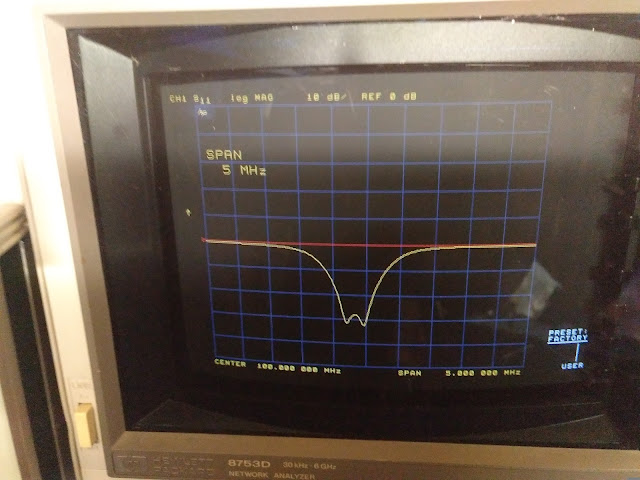Measuring the Return Loss of a Coaxial filter with an RTL Key , a Noise Generator an SWR Bridge , some software and a laptop
I ended now to test the possibility to measure the Return Loss of a coaxial filter with some simple tools , like an RTL Key , a Noise Generator and a SWR Bridge , a software and a laptop .
I have used the following setup :
And two different software :A) HDSDR ( that we already have used in three video for pointing satellites , measuring the satellite Beacons and check and measure in the FM band ) : https://www.hdsdr.de/
B) SATSAGEN from Alberto Ferraris : https://www.albfer.com/satsagen-download-page/
The results are in the following pictures :
HDSDR : Much faster , but easy to saturate , limited span and limited markers possibilities
SATSAGEN : Much slower , but difficult to saturate , no limited in higher span , big facilities on markers
At the end , at these frequencies and for these amplitude ranges , with SOME PATIENCE AND SKILLS, the results are quite "similar" to that of a professional HP instrument as follow :
Of course there are big limitations due to the Range of Visualization that an RTL KEY ( that works with 8 bit ) can handle ( around 40dB) respect a professional Spectrum Analyzer ( 100dB) and also the RTL KEY receive spurious signals and images . We have to take off all the AGC of the RTL Key to make measurements .
See for instance signals displayed with a range of 100dB and the range of 40 dB in evidence .
ALSO TAKE INTO ACCOUNT THAT THE POWER OF THE NOISE LEVEL OF THE GENERATOR IN THE SMALL BAND IS VERY LOW .
TYPICALLY - 50 dB DOWN RESPECT TO A NORMAL VNA .
THIS MEANS THAT THE MEASUREMENTS ARE EASILY AFFECTED FROM NOISE AND ALSO FROM INTERFERENCES FROM THE FM BAND SIGNALS !
NOT EASY TO PERFORM IN A CROWDED SITE .
DOUBLE SHIELDED CABLES ARE A MUST ANYWAY !
Claudio Re







Commenti
Posta un commento